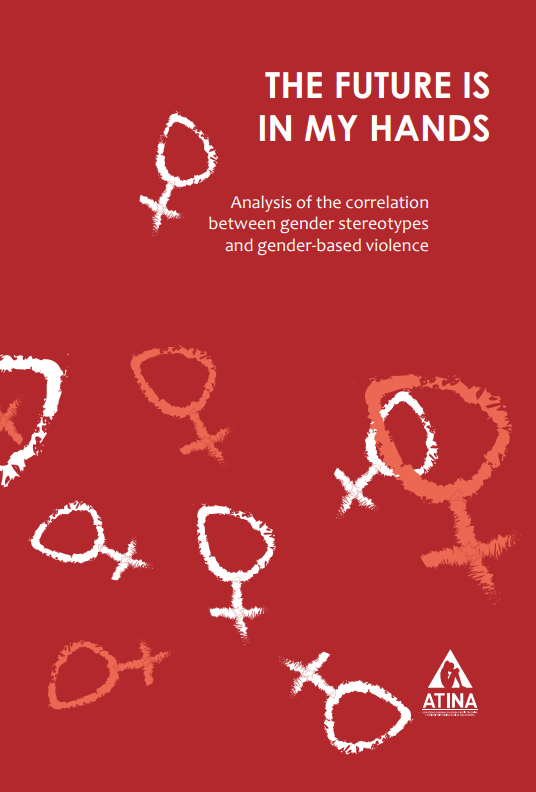Hotline: +381 61 63 84 071
The Future is in My Hands - Analysis of the correlation between gender stereotypes and gender-based violence

“The Future is in My Hands” - Analysis of the correlation between gender stereotypes and gender-based violence
“Do not ever tell her that she should or should not do something because she is a girl. ‘Because you are a girl’ is never a reason for anything. Ever.” Dear Ijeawele, or A Feminist Manifesto in Fifteen Suggestions - Chimamanda Ngozi Adichie
As a part of its efforts to permanently prevent situations in which girls are told to do or not to do something just because they are girls, “Atina” - Citizens association for com- bating trafficking in human beings and all forms of gender-based violence has launched the initiative “With and for Girls - Support to Local Youth Offices in Raising Awareness on Gender Equality”, which has produced the publication “The Future is in My Hands” that is before you. This publication presents the results of a survey conducted in the second half of 2018 in five municipalities and cities in Serbia - Obrenovac (Belgrade), Vranje, Novi Pazar, Jagodina and Kikinda, with girls of senior years of secondary schools, with a goal to examine their views and experiences about gender roles and gender-based violence. The idea of conducting such a research originated from the fact that no comprehensive social research has been conducted for many years in Serbia, especially not with a focus on girls aged 18 and 19 (age when they formally become independent and begin to consider their future more thoroughly), and which would look at their views on gender roles and their broader, social engagement.
Back in 2010, as part of the research conducted at the time, “Gender and LGBT Discrim- ination: It Exists and Thrives,” Citizens association Atina considered an advancement of gender equality in society. As part of this research, 249 young men and women were interviewed and they listed a whole series of problems to be solved, highlighting three fields: work, violence against women, and decision-making. At that time, they suggested changes of the tradition that could be described as “women in aprons, men in suits”; in other words, they called for elimination of prejudice and stereotypes, in order to improve the position of women”, and “changes in opinions and actions of individuals “etc. Citizens association Atina initiated the research precisely on these foundations, and later it resulted in the publication “The Future is in My Hands”.
It was also important for the insight into opinions on gender equality of girls from various parts of Serbia to be obtained right now, when the Republicof Serbia is explicitly committed to nurturing gender equality as one of its priority social values, and continuously promoting it in the political discourse. This is why opinions of these girls are of crucial importance, because they reflect the same commitment of the state of Serbia, in other words, they show how the state really cares for a deconstruction of gender stereotypes, forreducing and eradicating violence and truly improves the position of women in society today. The girls’ responses, highlighted in this publication, are a mirror of the implemented policies and efforts of the state to address these problems seriously and solve them. In relation to this, the research has taught us that our society has a potential for change in terms of tolerance to partner violence, that a total of 95 percent of interviewed girls believe that women do not have to endure everything in order to preserve their marriage, but gender stereotypes that judge young people’s behavior, thoughts and actions, and not just those of young people, remain deeply anchored in the society. As much as 76 percent of girls said that they encountered situations in which they were told that they were not good enough in something just because they were girls, while 42 percent of them still believe that a woman is fully accomplished only when she becomes a mother. And, one of the most common, deep-rooted stereotypes is that mother must sacrifice everything for her children - a total of 81 percent of the girls interviewed in the research believe in it. In relation to this, these findings could represent a framework for future state policies in this field, and a road-map for designing and implementing specific measures and activities by all state authorities, educational and other institutions that are focused on working with girls and with young people in general.
Finally, while reading this publication, we are not only gaining insight into the views of girls on gender equality, but also on the most important problems they face in their communities, that is, their personal experiences, and their views on how to overcome these problems. Moreover, the findings listed in the publication are substantiated by specific examples, which the girls mentioned in the survey, and their proposals for resolving the identified difficulties, and this is an additional gain for this publication in terms of contents. We are convinced that you will find useful information and inspiring conclusions in the text before you, and we would therefore like to invite you to join us in the fight for gender equality, for building a society without violence and discrimination, a society which respects diversity and provides foundations for development of our individual potentials. The girls clearly recognized the role of civil society organizations in this fight, but we should all participate, because only if we join forces we can expect to persist and win in this fight.
For Association Atina
Jelena Hrnjak, programme manager
Belgrade, 2019












 FACEBOOK
FACEBOOK TWITTER
TWITTER YOUTUBE
YOUTUBE